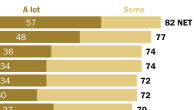
Overall, a slim majority of the public (53%) expresses a favorable view of Mormons, while 27% view Mormons unfavorably. Among religious groups, solid majorities of white mainline Protestants (62%) and white non-Hispanic Catholics (59%) express favorable opinions of Mormons. But among white evangelical Protestants, just 46% have a positive impression of Mormons, while 39% have an unfavorable opinion.
There also are substantial educational differences in opinions about Mormons: 64% of college graduates express favorable opinions of Mormons, as do 56% of those with some college experience. But fewer than half of those with a high school education or less (45%) have a positive impression of Mormons.
About three-in-ten (31%) of those who express favorable opinions of Mormons cite personal experience as the biggest influence on their opinions, but a fairly large proportion of those with negative opinions of Mormons (23%) also point to their personal experiences as being most influential.

A slim majority of the public (52%) says that Mormonism is a Christian religion, while nearly one-in-three (31%) say that Mormonism is not a Christian religion. White evangelicals stand out for their view that the Mormon religion is not Christian: a 45% plurality says that Mormonism is not Christian, while 40% say it is. Among white evangelicals who attend services at least weekly, 52% believe that the Mormon religion is not Christian. By contrast, large majorities of white mainline Protestants (62%) and white non-Hispanic Catholics (59%) say that Mormons are Christians. In addition, those with no formal religious affiliation also say that the Mormon religion is Christian by a wide margin (59%-25%).

Even though a slim majority of the public views Mormonism as a Christian religion, most Americans say it is very different from their own religion. Among non-Mormons who express a religious preference (most of whom are Christians themselves), more than six-in-ten (62%) say that Mormonism and their own religion are very different; just a quarter says that Mormonism and their own religion have a lot in common. The vast majority of white evangelical Protestants (67%) reject the idea that Mormonism and their own religion have a lot in common, as do smaller majorities of white mainline Protestants (56%) and white non-Hispanic Catholics (61%).
Mormonism in a Word
When asked to describe their impression of the Mormon religion in a single word, somewhat more offer a negative word than a positive one (27% vs. 23%); 19% give a neutral descriptor. The most common negative word expressed is “polygamy,” including “bigamy” or some other reference to plural marriage (75 total responses), followed by “cult” (57 total mentions).

But while many people associate polygamy with Mormonism, nearly as many think of “family” or “family values” (74 total mentions). Other positive words commonly used to describe Mormonism include “dedicated” (34 mentions), “devout” or “devoted” (32 mentions), “good” (31 mentions), and “faith” or “faithful” (25 total mentions).
Familiarity with Mormonism and Mormons

Overall, the public’s level of self-reported familiarity with Mormonism and Mormons is not much greater than its level of familiarity with Islam and Muslims. Roughly half (49%) say they know a great deal or some about the Mormon religion and its practices, while about as many people (48%) say that they know someone who is Mormon. (By comparison, 41% have at least some knowledge of Islam and 45% say they know a Muslim.)
As might be expected, people in the Western part of the United States have more contact and greater familiarity with Mormons than do people in other parts of the country. Fully 74% of those in the West say they know a Mormon, compared with fewer than half in other regions. In addition, 66% of Westerners say they know a great deal or some about the Mormon religion, also a much higher proportion than among residents of other regions. Among religious groups, white evangelical Protestants show somewhat greater familiarity with Mormons and Mormonism, compared with white mainline Protestants, white non-Hispanic Catholics, and the religiously unaffiliated.

Just as knowing a Muslim is associated with positive views of Muslims and Islam, having an acquaintance who is Mormon is linked with more positive opinions of Mormons and Mormonism. The large majority of those who know a Mormon (60%) express a favorable view of Mormons, compared with fewer than half (44%) of those who do not personally know a Mormon. And those who are acquainted with a Mormon are 11 points more likely than others to say that Mormonism and their own religion have a lot in common.
But compared with knowing someone who is Mormon, one’s view of whether or not Mormonism is a Christian religion has a much greater impact on overall opinions of Mormons. Among non-Mormons who see Mormons as Christian, more than two-thirds (68%) express a favorable view of Mormons, twice as many as among those who say Mormonism is not a Christian religion (34%). Equally striking, fully 42% of those who believe the Mormon religion is not Christian say they would be less likely to vote for a Mormon for president; among those who believe Mormonism is a Christian religion, just 16% express reluctance about supporting a Mormon.




